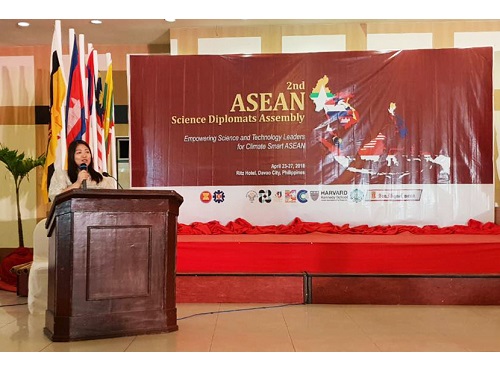
April 28, 2018 Saturday

April 28, 2018. Representing the Climate Change Commission (CCC) at the Closing Ceremony of the Second Association of Southeast Asian Nations (ASEAN) Science Diplomats Assembly held at the Ritz Hotel in Davao City yesterday, Commissioner Rachel Anne Herrera urged experts to enhance government and public engagement in the context of greater and more ambitious climate action.
The Science Diplomats Assembly aims to build collaboration and partnership among ASEAN scientists and engineers to address the impacts and risks of climate change in the region.
This year, 19 representatives from seven ASEAN states qualified to participate in the five-day capacity building workshop on communicating scientific or technical information in a variety of public and professional interactions, which includes writing grant proposals, discussing ideas with students, or participating in media interviews and public fora or seminars.
In her speech, Herrera congratulated the second batch of ASEAN Science Diplomats[i], who were chosen for their exceptional track record in research for climate change, food security, water sufficiency, and sustainable energy.

“As scientists, your work is vital in determining climate change scenarios, but equally critical if used to help our people find ways to adapt to the worst impacts,” she said as she encouraged the delegates to reach out and communicate to their respective government officials and leaders the urgency of climate action.
Environmental and Climate Research Institute (ECCRI) Executive Director Glenn Banaguas, Chair of the ASEAN Science Diplomats Assembly, echoed Herrera’s message, reiterating the need for scientists and engineers to communicate scientific data and projections to the masses.
Aside from the 19 ASEAN science diplomats, special recognition were given to Marawi State University Prof. Madid A. Sheik, Engr. Abu Ammar Mama Mangoranga, and Prof. Warlito M. Sanguila for their exceptional contribution to the scientific community in Mindanao.
Mindanao Development Authority (MinDA) Planning and Policy Director Reyzaldy Tan reminded all the awardees of the shared responsibility and accountability of the government and the scientific community in safeguarding communities against the impacts of climate change.
Tan also commended the project development skills of the awardees for coming up with sound project proposals on food security, water efficiency, and energy efficiency during the assembly’s collaborative proposal grant writing session. “Young scientists are catalysts of technology for a climate–smart ASEAN. We hope to see the results of the project proposals,” he noted.
The Second ASEAN Science Diplomats Assembly was organized by the ECCRI, in partnership with MinDA and the Harvard Kennedy School Alumni Association of the Philippines.
See https://eccri.ph/ for the full list of the 2018 Outstanding ASEAN Science Diplomats